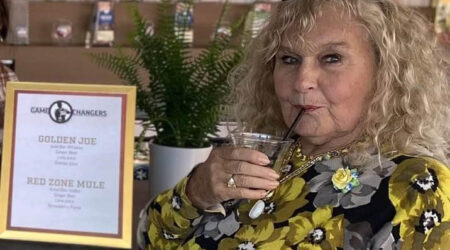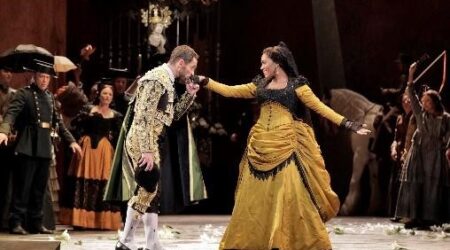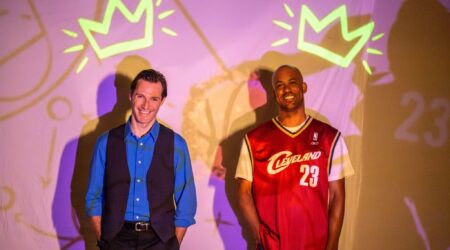Wailing in Jerusalem
The hot white wind whistled quietly in the neat rows of Jerusalem’s labyrinthine cemetery, built right into a mountain. Everything was the color of the desert dust – the three-story rows of tombs, the narrow ledges for candle holders and the small misshapen desert rocks, left by visitors. I would have never found my grandmother’s […]
The hot white wind whistled quietly in the neat rows of Jerusalem’s labyrinthine cemetery, built right into a mountain. Everything was the color of the desert dust – the three-story rows of tombs, the narrow ledges for candle holders and the small misshapen desert rocks, left by visitors.
I would have never found my grandmother’s grave if it wasn’t for Inna, my grandmother’s friend who lived in a small town outside of Jerusalem. I called Inna as soon as I flew into Israel, almost a year since I started my journey around the globe, and now here I was, tracing my fingers over the cold, black Russian letters of my grandmother’s name on the grave.
There was no one else in this section of the cemetery and in the morning stillness, miles away from the last place where I last saw my grandmother more than two decades earlier, I suddenly felt the warmth of her round tanned face with bouncy reddish curls leaning toward me with laughter that rang like wind chimes. The image was as clear as if it happened yesterday.
I didn’t want to leave, but the taxi was waiting.
On the way back, when we stopped to wash our hands and drop a few shekels into the metal donation box at the gate, Inna said, “I’m really glad you came to visit your grandmother. I see a lot of similarities in you.”
I felt that as well. Besides our mutual interest in literature, we shared a sense of reckless independence that propelled us both to leave one life in search of another. I ran away from a marriage that no longer worked and hoped to once again find my place in the world. My grandmother ran away from the Soviet Union in hopes of curing Alzheimer’s in Israel, where a few of her friends had already made a home.
I felt like despite a five decade difference in age, we could have been friends. I enjoyed talking to Inna about my grandmother, books, journalism and traveling, but our time was cut short as she had to hurry home for the Jewish holidays.
I headed for the Old City where my brother was waiting for me near the Wailing Wall. On the way, I thought how badly I wanted to have older friends. I crave their wisdom and envy their ability to clearly see the patterns of life instead of constantly and blindingly trying to find the right path.
When I entered the Old City through the Yaffa Gate, it was dizzying. I was running late to the meeting with my brother, so I hurried down the market alleys of the Old City where a boiling river of tourists flowed slowly past the dogged shop keepers who sat under the bright lights shining onto their red carpets, wooden crosses, miniature chess sets, gooey baklava. “Can I ask you a question, miss? Excuse me, miss! I just wanted to ask you…” they called as I flew past them keeping my guard, getting stuck behind a sea of saris negotiating for a trinket “Ok, 100 shekels because I like you”; ducking under the giant trays of sesame seed bread carried by dark young men; past more bright store lights, then a break between stalls, brief turn of the head where a robed Muslim man sat in a musky green dungeon talking to someone invisible; “Yes, daddy, I’ll meet you at Jaffa Gate,” said a fat British girl on the phone; more carpets, glassy evil eye blues, silver earrings… Stop! Something caught my eye.
I tracked back to a stall with antique oil lamps, samovars and bowls, whose dusty silver metal belonged in a black and white war time film about things that remained after the Jews left for the ghetto. Among the heap of unpolished silver, I saw the old shopkeeper’s watery blue eyes.
Wrinkled by time and the Middle East’s weather, they reflected the deep blue of his simple work shirt and the inner calm of someone who belonged under the shade of an oak tree in a fragrant, windless meadow, not in the madness of a bazaar.
I wanted to take his photograph, so I came closer expecting the usual “Where are you from?” refrain, which, having left my old home earlier that year and still unable to find a new one, I didn’t know how to answer truthfully. Instead, he invited me into his shop.

“Take five minutes inside,” he said, his accent soft and intelligent. His name was Omar.
“But I’m in a hurry, someone is waiting for me,” I said skittishly. It felt like an excuse.
“Our whole life passes as we hurry,” Omar replied. “When we are kids, we hurry to grow up. Then…”
“Yes,” I interrupted the familiar thought. I remembered the hurried routine of my old life – work, lunch, work, dinner with husband, bed, work, meetings, weekend, work. “I know. Everyone always hurries. But I haven’t been in a hurry this whole year.”
“Did you find yourself?” he said suddenly as if he knew that that was exactly what I was doing during the trip that now brought me to Israel.
“I think so. That’s what I’ve been trying to do anyway – find myself.”
“Then take five minutes, I want to ask you something,” he said.
I hesitated.
“You keep a guard, but you shouldn’t,” said Omar, looking up at me from his stool. “You’re beautiful, intelligent, sensitive, and a little stubborn. Come.” He gestured toward the depth of the silver cave, “I want to talk to you.”
I could have said no and left for the Wailing Wall. After all, saying no is always easier, but one thing I learned during my travels is to be open to different offers, especially unexpected ones. So I abided and sat on a soft cushion in front of ivory bracelets and old clocks that framed Omar’s small figure.
Without much of a pause, he asked “Are you in love with yourself?”
Wait, what?
I wanted to answer truthfully, but it wasn’t easy. Though I never suffered from low self-esteem, the recent divorce made me feel like I had failed life’s most important exam.
“Sometimes,” I said.
“Why sometimes?”
I paused again, pretending to look at the row of bracelets hanging in front of me. I didn’t want to explain the particulars of my situation, so I answered with a question.
“Can you love yourself if you feel that no one else loves you?”
To my embarrassment, I felt a tear roll down my cheek. I despise self-pity, so I turned away, pretending to look around the store and said something about the old samovar on the shelf. But Omar didn’t want to get distracted by his wares. He was looking at me with curiosity instead of pity.
“To love yourself doesn’t mean to be selfish,” he said. “To love yourself means to be at peace with your body, your soul, with who you are. I see that you’re hiding yourself because you feel ashamed of your tears, but even with tears you are beautiful.”
At this point, my tears started streaming down my face.
“Love is so simple. I realize I haven’t known you for very long,” he said, raising his hand to his heart. “But I love you.”
He said it so naturally that looking in his serene eyes, I felt completely certain that in this strange magical silver cave with chaos boiling just steps away, in this transitional moment of my life, this unfamiliar person did, in fact, love me.
Who said that love is the life-long emotion that wives feel toward their husbands and mothers toward their children? Why can’t love be a sudden burst of sunshine in a dusty store of Old Jerusalem?
While the antique clock slept above Omar’s head, three women walked into the store, breaking my trance. I looked at my watch. I was now an hour late. But having spilled my tears onto the bazaar’s ancient floor, I no longer needed the Wailing Wall.
Photos by Sasha Vasilyuk.
Sasha Vasilyuk is a former newspaper journalist who just came back from her own 9-month version of ”Eat, Pray, Love,” which taught her that anything is possible when you’ve got an open road and an open heart.
Sasha Vasilyuk








